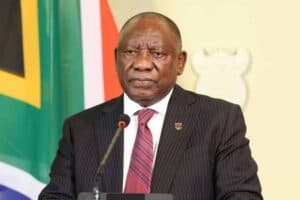Agriculture Minister John Steenhuisen says South Africa clearly has a crime problem that is now probably on the radar of the world.

The SA delegation to the White House emerged “in better shape than we went in”, says Agriculture Minister John Steenhuisen, with all hopeful the relationship between Pretoria and Washington can be reset, after “giving the Trump White House some food for thought.”
Experts called the meeting a diplomatic draw, but said US President Donald Trump was noncommittal about whether he is willing to come to South Africa this year for the G20 summit, where the US will take over from SA as head.
His secretary of state, Marco Rubio, said this week Trump and the US would not be part of the meeting.
It was “instructive when Trump was asked, ‘Is your mind made up about the genocide?’ He said, ‘No, it’s not.” I think we’ve given them some room to think,” said Steenhuisen.
‘Kill the Boer’ videos and surprise printouts
It was “never going to be an easy meeting”, he said, adding that “obviously the big surprise was the videos shown in the Oval Office”.
The videos were of Julius Malema leading EFF supporters singing Kill the Boer, Kill the Farmer, as well as Jacob Zuma singing similar apparently anti-white songs from the struggle years.
Trump also produced a sheaf of article print-outs which, he claimed, were evidence of the South African “genocide”.
Steenhuisen said despite the surprise, “that gave us an opportunity to distinguish the new partners from the protagonists in the video, which were Malema and Zuma.
ALSO READ: Ramaphosa says Trump meeting a success despite ambush [VIDEO]
‘We’re in government to keep them out’
“And that’s what gave me the great pivot to be able to say: ‘Look. we are in government to keep those people out of government’.”
Away from the glare of the TV cameras and microphones “Trump was really warm and generous”, Steenhuisen said. In the private exchanges, Steenhuisen, along with golf stars Ernie Els and Retief Goosen, got to talk about SA’s problems.
“I think the golfers did a lot of work to defend things, particularly over the lunch, where Trump was very clearly relaxed,” said Steenhuisen. “I enjoyed the banter about golf. He is clearly very engrossed with golf.”
Farm murders, crime and political optics
However, “the meeting was a wake-up call for us”, he said. “We’ve clearly got a crime problem that probably is on the radar of the world now. It certainly is on America’s radar and we’ve now got to deal with it.
“The white House visit has given us and opportunity to really start to make some strides on farm attacks and farm murders. It was important to say that we’re not going to sugarcoat this. We have a problem.”
Former DA leader and ambassador Tony Leon said the White House meeting was “theatrical, bordering on the absurd” and, in the end, “there was no true victory, yet, for either side”.
“While the SA delegation set out to dispel some of the falsehoods, the truth is that the high level of crime in South Africa is not reassuring,” Leon said.
ALSO READ: Here is the origin of the white cross video Trump used to ambush Ramaphosa
Competing agendas and geopolitical fallout
Trump “was not really interested in much else at the time other than coming across as the saviour of white people the world over”, he added.
Political analyst Ntsikelelo Breakfast believes the tension between the US and South Africa will be mended soon.
“The fact that Trump agreed to listen to South Africa’s side of the story shows he cares about relations between the two countries.
“There is no South African president who wishes to be held accountable for failing to save the country’s relationship with the US because it is vital. We simply cannot afford to jeopardise our relationship with that country,” said Breakfast.
Political analyst André Duvenhage said Ramaphosa and his team’s visit to the US was a historical moment: it was the first time since 1994 that, in public, an international superpower has taken the side of white people because of farm murders and racial discrimination.
“That must be a turnaround in some way and talking about what happened in the open session, it was clear that the two parties worked with different agendas. I think the Trump agenda was to put certain blame on the ANC,” said Duvenhage.
“I believe it has a lot to do with the Jewish connection and the fact that South Africa initiated the court case against Israel.
“From the side of South Africa, it was more aligned with getting trade opportunities, getting investment from the United States and clarifying their positions.”
NOW READ: Will Trump go after Malema and Zuma? IRR says ‘Kill the Boer’ chant created problems for SA






